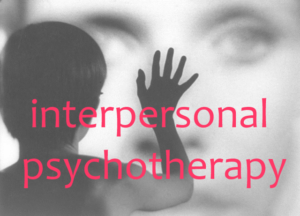 People who find themselves in need of marriage counseling are not likely to have come across the term Interpersonal Psychotherapy (IPT). There are many different techniques for marriage counseling, and too much terminology can be off-putting for people who already find themselves in a stressful situation.
People who find themselves in need of marriage counseling are not likely to have come across the term Interpersonal Psychotherapy (IPT). There are many different techniques for marriage counseling, and too much terminology can be off-putting for people who already find themselves in a stressful situation.
With that said, it is important to understand the type of treatment being provided to you in marriage counseling, the meaning of the term, or how it might help your situation. Taking the time to understand IPT can give couples a much better idea of what skilled therapists and counselors can accomplish — and even what some of the underlying relationship issues might be.
ITP is a psychotherapeutic method dating back to the 1970s. We won’t get too deeply into the people behind the method here — we’ll skip right to the shorthand explanation. ITP is a way to treat issues around mental health. The specific aims of the treatment are to help people address both personal concerns and interpersonal relationships, understanding how one affects the other.
Initially, ITP was developed as a treatment for depression specifically. In the years since, it has proven highly effective (with various modifications) for several other issues, including but not limited to: post-traumatic stress disorder, anxiety, bipolar disorder, substance use problems, social phobia, postpartum depression.
So how does a ‘method’ or model that was designed for treatment of depression help relationships? Put simply, there is very often a connection between relationship issues and depression (or other mental health issues). Unhealthy relationship dynamics are often present during the early stages of depression. At the same time, these issues often weaken and debilitate relationships. There are many cases in which one partner does not have the knowledge, awareness or tools to help the other partner with specific mental health issues and thus strengthen the relationship.
IPT makes use of established theories and specific techniques to explore the various personal and interpersonal issues that affect relationships. Couples may find themselves with various specific challenges that need to be addressed, such as tension over roles in the relationship, personal or interpersonal shortcomings, grief or other transitions between different phases of life, and various other conflicts that undermine the health of marriages and relationships.
The training, personality and expertise of any counselor who makes use of IPT is something that must be stressed. A qualified and skilled therapist or counselor will play a role that is active, constructive and efficient — without being judgmental.
But does it work?
In many cases, IPT has resulted in positive outcomes for couples. IPT is an effective and treatment and endorsed by both the National Institute of Health and the American Psychological Association. When underlying psychological issues are addressed, relationships can benefit significantly as one or more partners “opens up” to a clearer understanding of why the relationship or marriage is under stress.
Obviously, there is much more to learn about IPT — especially if you’re currently in the midst of mental health issues and/or relationship challenges. Finding a qualified specialist who practices IPT is the best way to learn about that counselor’s personal style and philosophy, and whether IPT might be a constructive step in your relationship.
